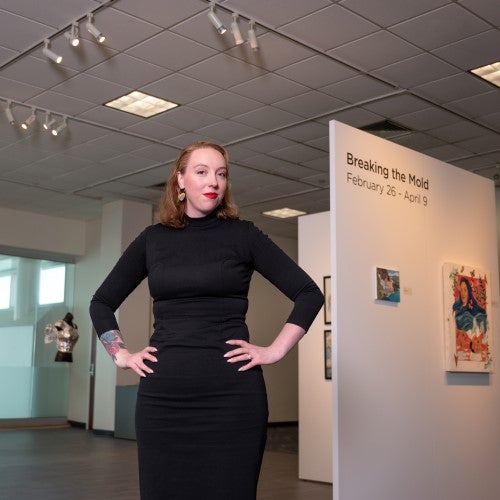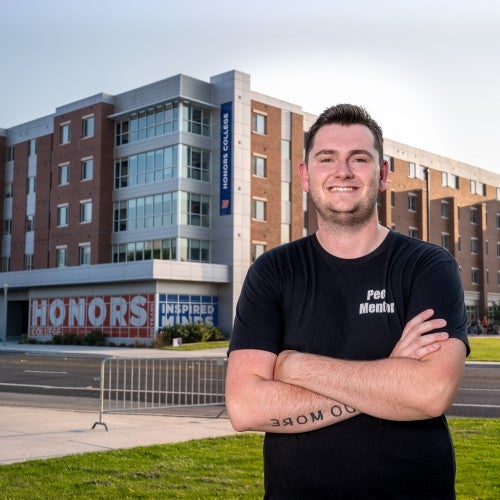All students, even the highest achievers, can have moments of confusion when they come to college. They’re navigating a new environment with new expectations and rules. They’re often doing it alone.
Since 2009, the Peer Mentor program in Boise State’s Honors College has helped new students find their way. Now, its successes have earned national attention. Other higher-education institutions want to know: What makes this program so great?
The program began as support for a new first-year Honors College course, Honors 198. Chris Hyer, associate director of the college, created the course as an introduction to university life. Hyer initially wanted upper-division students to serve as informal mentors for first-year students.
“It seemed like a great way to remove some of the barriers, give new students an older peer to connect with, ask questions and build that sense of belonging,” Hyer said.
As the program evolved, Hyer honed the processes of training mentors — implementing a pre-semester orientation and training program. When the new honors class (typically around 300 students) gets to campus in the fall, students are sorted, Hogwarts-style, into one of six “houses.” The peer mentors facilitate a welcome program based in friendly competition between the houses to help orient students to college life.
Conversation is the key
The welcome program includes one mentor’s favorite things: community building.
“I love promoting interaction,” said Ian Lambrecht, a junior geosciences major with a secondary education emphasis. “I’ll sit down at a picnic table with six people who don’t know each other and I’ll say, ‘I’m Ian. Let’s talk.’ I love doing that because it keeps everybody involved.”
Lambrecht, who’s from nearby Meridian, Idaho, takes the work of building healthy bonds with students seriously. “I don’t want them just to see me as this weird upperclassman guy. I want them to see me as a friend, a mentor, a leader, someone they can come to when they’re struggling,” he said.
After orientation, the second phase of peer mentoring begins. Honors 198 now features one large weekly lecture led by Hyer. Then the students meet in smaller discussion sections, each led by a pair of peer mentors.
The mentors, who are matched according to complementary skill sets, learn how to write lesson plans, lead peer reviews and facilitate discussions of the week’s concepts. In this active, experiential learning process, both mentors and students open up.
“Interacting with students and getting to know them, building that level of trust — the amount of things that I’ve been entrusted with as a peer mentor is mind-boggling,” said mentor Mandee Snowden-Edmonds, a history major from Crescent City, California, who graduated in spring 2023.
Students also feel more comfortable challenging the course concepts in their mentor-led discussion sections.
“When students disagree with a reading, that’s good. It shows that not everybody’s going to have this same experience or think the same way as you,” Snowden- Edmonds said. “And that’s another important thing to keep in mind when you go to college. Sometimes, you might be wrong.”
An ongoing connection
By all measures, the Peer Mentor program has fulfilled its task of helping new students feel connected.
“Students talk about how their mentors were really there for them,” Hyer said. “They’ve helped them find different opportunities on campus. Students are joining organizations and reaching out after the semester closes. A lot of these mentoring relationships continue on into the following semesters.”
Hyer and others have given presentations about the program at national conferences, and multiple colleges have reached out to Hyer about how to implement it on their own campuses. The program has gotten results closer to home, too.
“Our retention rate of students staying in the program is about 97 percent, which is pretty huge,” Hyer said. “I think we can really attribute that to students feeling like they’re valued, feeling like they matter.”
Meet the mentors
Mandee Snowden-Edmonds (BA, history, 2023)

Mandee Snowden-Edmonds joined the U.S. Army when she was 17. Her five-year military career included posts in Colorado, South Korea and a 15-month tour in Iraq. After she left the service, her long-held scholarly interests drew her to college. Her sister lived in Mountain Home, Idaho, which led her to Boise State. In her final semester, she organized “Breaking the Mold,” an art exhibition on campus of works by student- veterans.
“As veterans, you can lose a sense of identity and camaraderie that you had in active service. I wanted to help my fellow veterans express their service in many ways through art, to literally see things from a different angle, to show what it’s like to be a military member going through college, or dealing with PTSD or an injury. That’s what this show was,” Snowden- Edmonds said.
She contributed her own piece, a hanging sculpture called “Virago,” a term for female warrior, to honor a friend who died of breast cancer.
The mother of two children and married to a fellow veteran, Snowden-Edmonds is starting the master’s program in history at Boise State. She plans to pursue a doctoral degree and work in public policy.
She received numerous scholarships to study at Boise State including the Barbara L. Wilson Scholarship, the Latin Language Scholarship, the Sylvester Honors History Award, the Crankstart Scholarship, the Steve Schmidt Scholarship, the TRIO Veteran Student Support Services Grant and the Brown Honors Award. She also received an Honors College graduate assistantship for continued study.
“Receiving the scholarships was a huge help, because while my tuition was covered by the Veterans Administration, there were still the regular costs of living that I had to compensate for,” Snowden- Edmonds said. “Scholarships and grants allowed me to make sure that my needs and those of my family were taken care of. I could dedicate my time and energy to school and take on a heavy course load without fear or stress.”
Ian Lambrecht, majoring in geosciences

There was a time when Ian Lambrecht couldn’t have imagined himself as a mentor for other students, much less as an honors student. He was a “class clown” at Meridian High School in Meridian, Idaho, he said, until an advisor warned him he might not graduate. Lambrecht took the warning to heart, concentrated on his studies and flourished. He credits the college preparatory AVID (Advancement Via Individual Determination) program for his success. Today, in addition to mentoring students at Boise State, he is an AVID tutor at his alma mater, helping even more students transition to college life.
One of his proudest moments was when his former high school principal told him, “We all knew you were an honors student. You just didn’t know it yourself.” Since receiving his first A in geosciences freshman year, Lambrecht’s academic success has only grown.
“I came to Boise State with no money and no scholarships. I now have a near-full-ride and made the dean’s list my first two semesters,” Lambrecht said.
He received scholarships through the Honors College, the College of Education and the Noyce Scholarship for students in STEM fields who are intending to become educators.